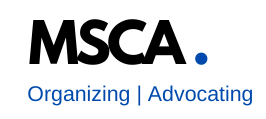Tiffany Chenault, Salem Chapter President, Addresses Board of Trustees
Yesterday, at the Salem State University Board of Trustees meeting, Chapter President Tiffany Chenault addressed the Board’s two-week delay in tenure and promotion considerations. The Board delayed the decisions, causing undue stress for these members, solely due to budgetary concerns. You can view Tiffany’s entire statement here.
Tiffany addressed the Board’s misunderstandings regarding the collective bargaining agreement, stating:
“As Union chapter president my role is to advocate and support the faculty and librarians. I represent them. And part of that representation has to deal with the governance processes articulated in the faculty contract.”
Tiffany went on to clarify that:
“…our contract is a living, breathing document that provides governance between the MSCA faculty and the Council of Presidents. My role and the role of the union is to advocate for the welfare of our members and negotiate and enforce the collective bargaining agreement with our members.
“The 28 faculty members who are up for tenure and promotion have followed the rules and standards which qualify them for meritorious professorship that have been established and agreed upon in the contract. All of these decisions and processes in our union contract which have been followed have been vetted through rigorous policies and multiple steps.”
She further explained that:
“…when it comes to tenure and promotion, the contract, by providing an equal footing, is a way to address the gender and racial inequalities in faculty pay and recognition. It’s also important that our faculty composition reflects the diversity of our student body and the broader community we serve. The cohort of faculty up for tenure and promotion this year is one of the most diverse in the history of Salem State University.
“The other eight Boards that govern our sister institutions approved and understood the merit of their faculty promotions without delay or issue, despite them all being in a similar precarious financial situation.
“Just to be clear, when you talk about ‘the union,’ you are speaking about a collective with over 4,000 members with our eight sister institutions. You are talking about over 100,000 members that make up the Massachusetts Teachers Association, our parent organization. We have seen in so many states the collective power and importance of unions when it comes to advocating for sound educational policies and safe, supportive, and enriching learning environments for all students, regardless of race and wealth.”
But perhaps most powerful was her addressing of a larger issue:
“This is reflective of what recent weeks in the world at large have demonstrated; our society is changing. We are at a tipping point. The public has made it clear that the status quo, which has caused intergenerational trauma and present-day harm to black and brown people across our nation, is no longer acceptable. White people are joining the cause in record numbers, taking to the streets to assert to all decision makers and leaders nationwide that enough is enough.
“As a regional public university, the students we serve are among the most disenfranchised in the state. They are underprivileged and disadvantaged and they know they are vulnerable. They are resilient and hardworking, and they need the same shot at making it in the world as previous generations of white students had the privilege to do by attending the inexpensive public colleges of the 1950s, 60s, and 70s.
“We have a moral obligation to help them access a high-quality, affordable college education as a public service to the common good, as a way to push back against inequalities and to make it clear that their lives and futures matter too.
“Much like the people in the US are observing those in power and demanding change, so too are the faculty at Salem State watching the decision-making processes at this institution more closely than ever, and hopefully positive change will be the result.
“Now is the time to find ways to increase funding for the institution, not to cut.
“Now is the time to invest in strategies to retain our diverse junior faculty.
“Now is the time to set an example for public institutions across the state.
“Now is the time to let our black and Latinx students know that their voices are heard.
“Now is the time to strengthen anti-racist work through education and mentoring.
“Now is the time to reject austerity measures and call upon our state legislators to reinvest in public higher education.
“Now is the time for campus leaders, including our trustees and upper administration to seek out and enroll in high quality anti-racist leadership workshops led by black and brown experts.
“Now is the time to provide students with role modeling and curricula that defy the structures of racial and class privilege.
“Now is the time to declare that austerity in public education slows down the changes that are so urgently needed.
“Now is the time to recommit to the liberal arts core of our university, which helps students grow into well-rounded citizens who are critical thinkers.”
Tiffany Chenault, Ph.D.
MSCA Salem State Chapter President
